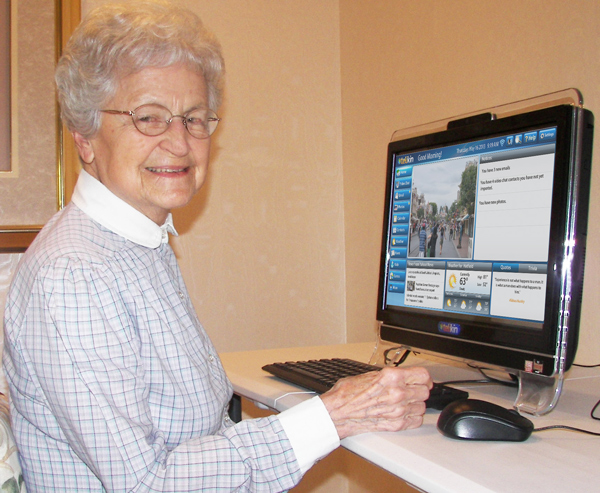Using the Internet Decreases Depression in Seniors
Author: Lauren Allegrezza
...led by professor Shelia Cotten, examined data on more than 3,000 retirees age 50 and older. In this study, of those who did not use the internet, 10% had depression, while only 7% of those who did use the internet experienced depression - a 40% decrease in occurrences of depression when all other factors were held constant. While there wasnt data on exactly what these users were doing on the internet, Cotten says that it doesnt really matter: Its really about being able to connect and communicate and find information you need.
We see that every day here at Telikin.
There are two major challenges of aging that a computer and internet can help a senior overcome.
The Miles Between
The first challenge is that families today are so spread out. A senior living in Arizona might have children in Utah, California, and Pennsylvania, and grandchildren spread out across the world in New York, Chicago, Switzerland, and London. Maybe she has some childhood friends that are still living, but they also live in different areas. How is she supposed to feel like she can stay in touch with all these people?
A computer and internet can help her connect with the people she loves on many levels. One of the most exciting ways is through video chat. Getting to see loved ones and have face-to-face conversations makes the miles between them disappear almost completely. In the words of one Telikin user, "to be able to chat with and see my grandchildren is as though they are here with me." Then there is also email, photosharing, and social networks like Facebook. All of these channels help keep loved ones close even whey they are miles apart.
Decreased Mobility
The second challenge is that as seniors age they may lose their mobility and no longer be able to get out of the house. This often causes feelings of isolation and loss of independence, which can lead to depression.
A computer can bring a new sense of independence and inclusion to someone who is unable to leave their house. Now they can shop online to get groceries and presents, read the news to know whats going on in the world, or do their banking online. They are no longer so dependent on other people to help them do the things they need to get done. Furthermore, they can communicate with people they might not otherwise see and talk with.
The daughter of one Telikin customer actually wrote to us saying, "Bought this computer for my mother who is mostly housebound and completely non technical...She has been emailing and Skyping family and friends. She told me that she feels less isolated and alone...thank you Telikin! And this is just one example of the kinds of stories we hear everyday!
17 Million
With all these benefits of computer, its a wonder that more seniors arent hopping online. According to the most recent data from Pew Research Center, 41% of seniors still dont use the internet. Since theres 43 million seniors in America, thats 17 million older adults who not only are missing out on staying connected with their families, but who are also at an increased risk of depression.
The Pew data also gave insights as to why some seniors are not adopting technologies:
77% feel as though they would need support to help them learn a new device 40% have physical or health barriers that would make using a computer difficult
This data shows why its so important that seniors have:
1) easily accessible, on-going support, and2) a device that is geared towards their needs and abilities
And here at Telikin, thats what were doing offering a computer designed specifically for seniors and also providing friendly and helpful technical and tutorial support. This combination - easy technology and great support - will help more seniors benefit from the power of the internet. Do you know a senior that would benefit from an easy to use computer? Give us a call - 800-230-3881!
Read more about the Professor Cotten's studyRead more about the Pew Internet Research data